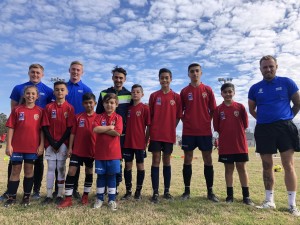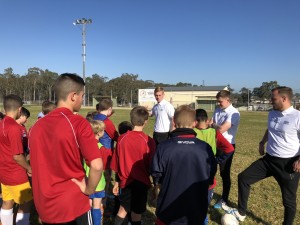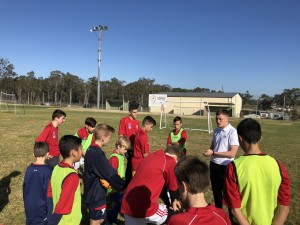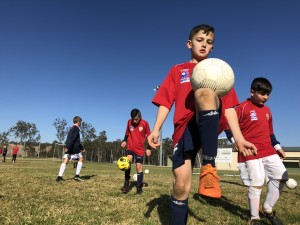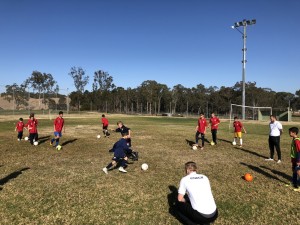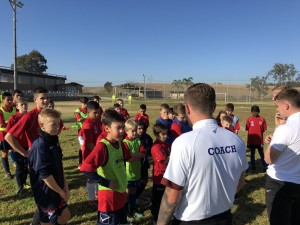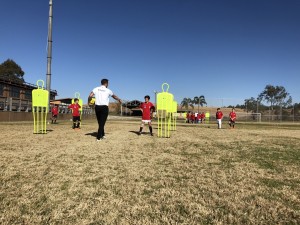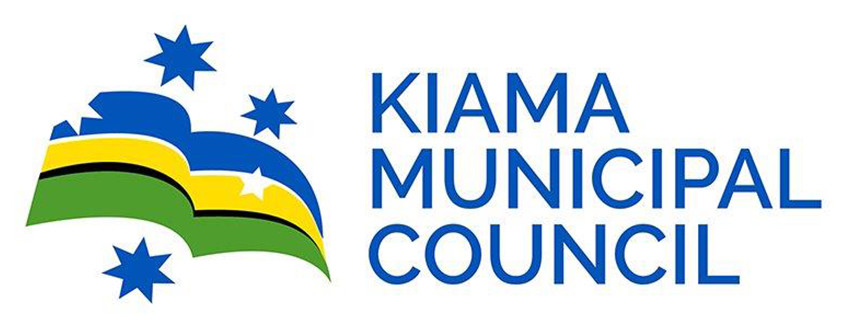Two weeks ago, three young Stoke City coaches, Oliver Porteous, Dan Barlow and Luke Cottage who are based in Shanghai, visited Sydney to conduct a three day coaching program for ASA Football in Sydney.
Roger Sleeman attended the first day of the program and was more than impressed with the high level of coaching on display.
ASA’s intention is to set up a similar affiliation with Stoke City at a Sydney school to provide up and coming youth players with the best coaching available.
In this interview with Oliver Porteous, Roger Sleeman explores the depth of coaching opportunity which is available in England, Porteous’s journey in coaching, his experiences in Shanghai and coaching ambitions.
ROGER SLEEMAN
How did you get into coaching at Stoke City?
OLIVER PORTEOUS
At the age of sixteen, I had a six week trial with semi-professional outfit, Altrincham, but despite my best efforts, I was unsuccessful.
I always wanted to make a career in football so I decided to go down the coaching road and gained my F.A. badges through the English Coaches Education Program.
It was then a process of creating opportunities for myself by getting involved with some Premier League academies and I was fortunate to be accepted by Stoke City.
In the meantime, I also obtained a degree in Sports Coaching at Chester University and subsequently did a six months Masters course in Barcelona.
People think it was an easy path but while I was studying for my degree and obtaining my F.A. badges, I gained experience in seven coaching jobs.
It was all about getting out on the pitch and surrounding myself with groups of good people who mentored me through the coaching pathway.
R.S.
How did you manage to arrive in Shanghai, and how long have you been there?
O.P.
After I had worked with another Premier League Academy and completed my time in Barcelona, I contacted Stoke City who advised me I may have to travel to fulfil my ambitions at the club.
They told me about their setup in Shanghai and I realised it was an ideal chance to create opportunities, to build a C.V. and create a network for myself.
I’ve actually been there for six months.
R.S.
How do the Chinese react to English coaches?
O.P.
You’re considered a professional in their setup and you have to get the message across.
At the moment the Chinese are undertaking a massive education phase and we’re showing them what best practice is in England.
The football culture has to be developed further but they do have massive professional clubs, SPG and Shenhua in Shanghai.
However, the local landscape is different to England because they have school and academy programs and international schools which operate independently.
When their ultimate pathway is linked, the whole picture of development will come together.
R.S.
What are the Chinese expecting from you as a coach?
O.P.
The enjoyment of a coaching session is paramount but the development of the players is critical because this is consistent with the culture and lifestyle of the Chinese.
They simply aspire to be the best.
However, they start the game later than English youth so the focus is on improving movement by concentrating on developing turns and perfection of balance.
This can be a challenge for coaches because time is limited due to their large school homework commitments.
Some government schools are trying to get an hour of football in a day so programs like ours concentrate on spending as much time as possible on the ball and on the pitch.
We’re finding the children enjoy this approach and want to do more and more.
R.S.
Is there a thirst for football in China, or does it have to be nurtured further?
O.P.
It has to be nurtured further but it’s getting there and everybody was talking about the World Cup.
As coaches we are well received and thought of as we build the picture to encourage them to provide better pitches, facilities and coaching so the the jigsaw puzzle is put together to assist development.
R.S.
What are the main things you concentrate on in a three day camp when you’ve never been involved with the players before?
O.P.
We get them into small sided games which suits their desire to play and ensure they get plenty of touches and can score goals.
This enables us to assess their ability early in the peace and we intervene on an individual basis to analyse the options available to the player.
We emphasise ball mastery for half an hour because it’s critical they can manipulate the ball in a match situation.
Through the three days, we also look at the tactical and psychological facets of the game because technical ability alone will not guarantee success if a player can’t integrate into a team environment.
R.S.
Was coach education and development reflected in England’s performance in the World Cup?
O.P.
There is no doubt the academies, schools and universities are leading the way in youth development and the fact we are world champions at u/17 and u/20 level is evidence of that.
England was one of the youngest squads at the World Cup so the system is working and there are greater opportunities for coaches than ever before.
R.S.
You are returning to England until the end of August.
Where will your career take you from there and what other opportunities are available?
O.P.
I will return to Shanghai for another twelve months and go back to England to undertake more FA courses and work with local clubs and academies to recap and consolidate what I’ve learned in Shanghai.
R.S.
What are your long term aspirations?
O.P.
My main aim is to obtain a first team coaching position with a Chinese club and move away from the development side of the game.
I want to immerse myself in the professional game where my coaching is results based.
Eventually, I’d like to return to England and find a League team to coach at.

